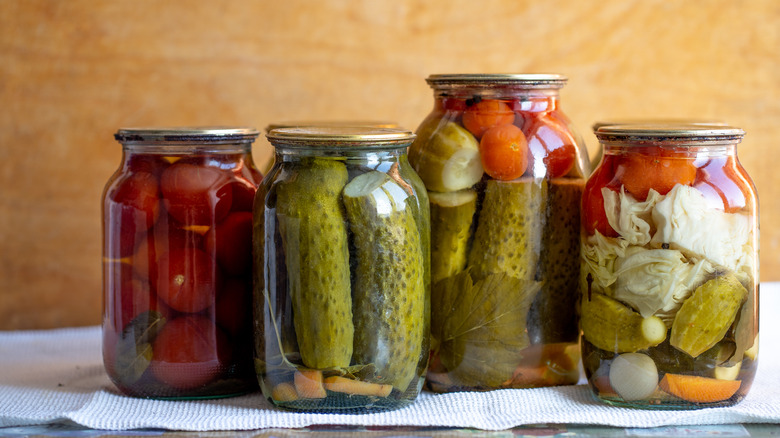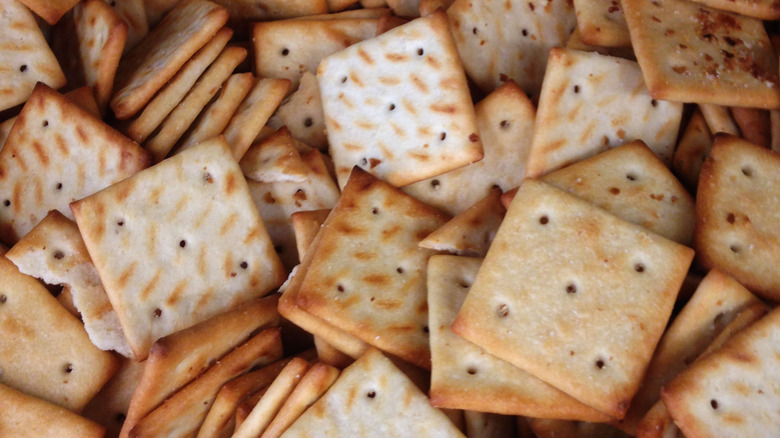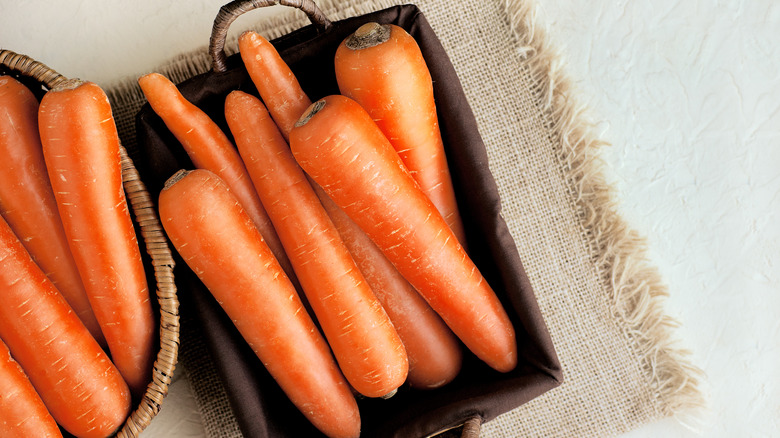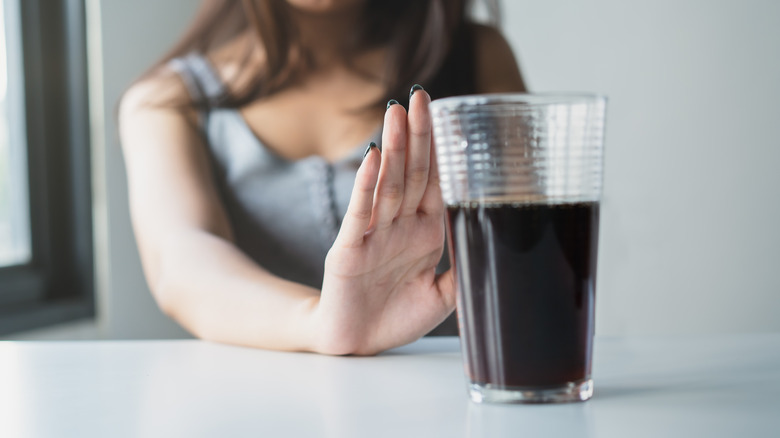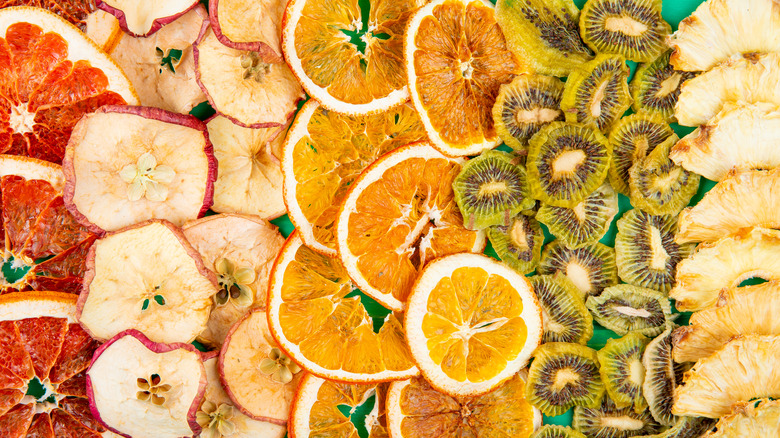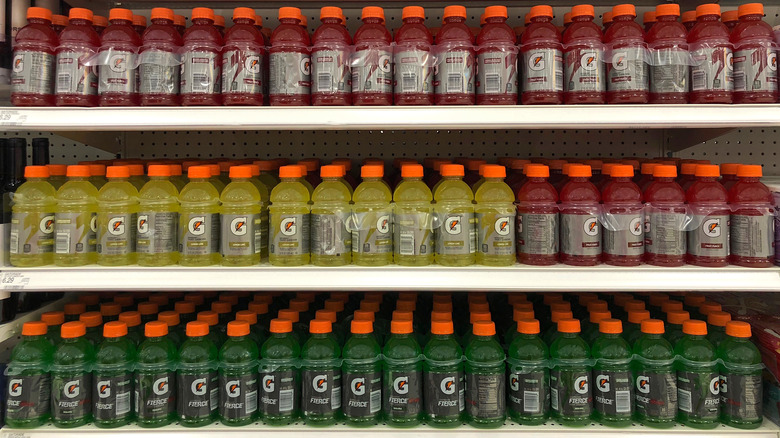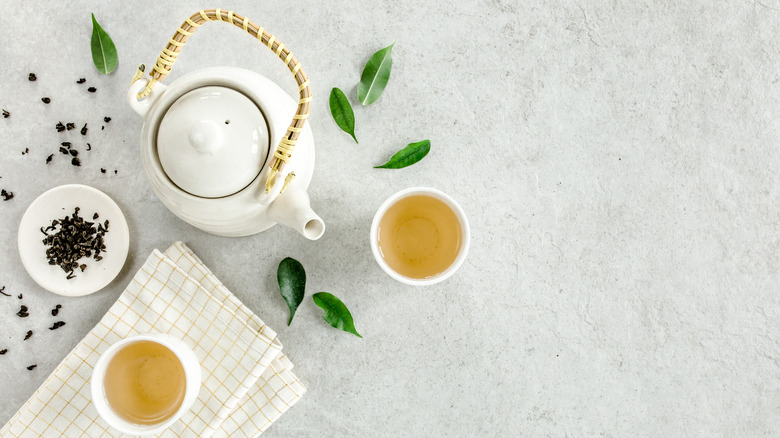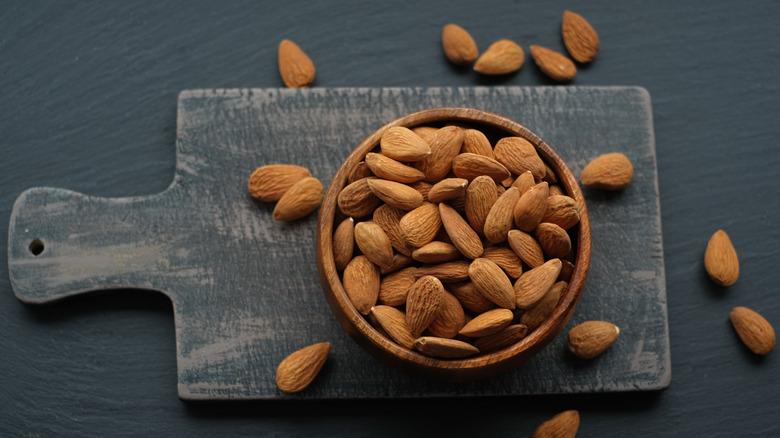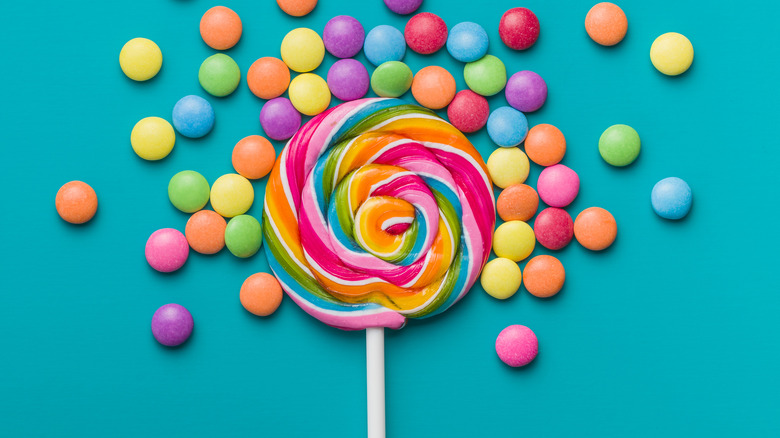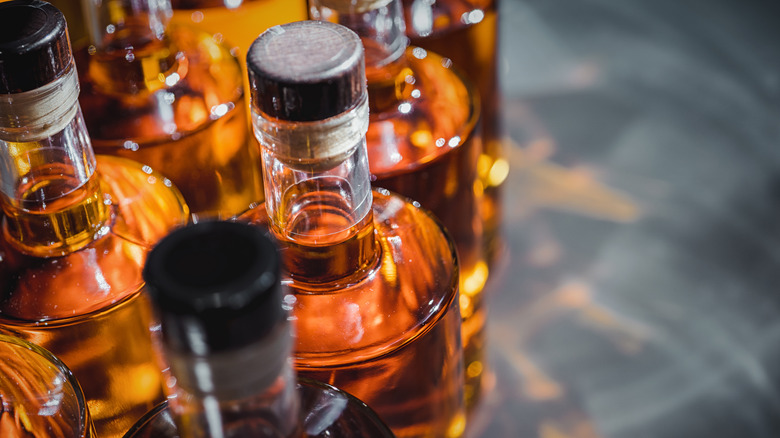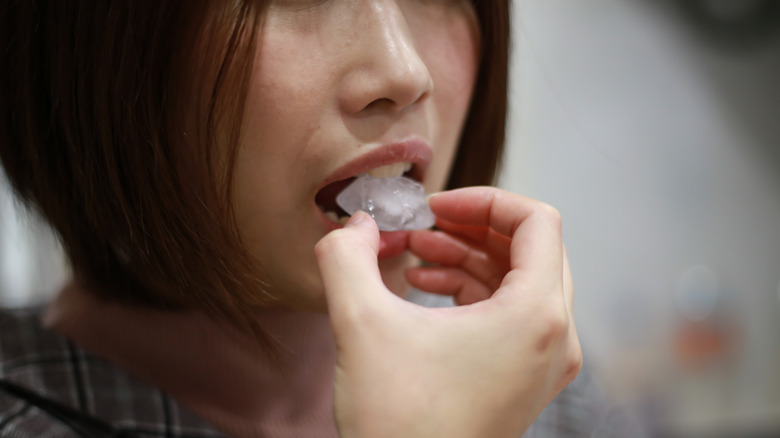Foods That Are Doing Damage To Your Teeth
It's all too easy to neglect our teeth until it's too late. Luckily, with 93% of Americans planning to visit their dentist in 2021, it appears there's been a dental health renaissance, and people are taking better care of their teeth than ever (per PR Newswire). With the pandemic encouraging over 70% of Americans to spend more time thinking about their dental habits and health, too, there's never been a better time to take stock of the foods you're eating to think about how they could be impacting your teeth.
But how, when so many delicious foods out there are laden with sugar or high in acid, do we avoid eating things that can cause our teeth problems? According to dental experts, it's all about moderation. "It's when we excessively use one thing that [it] can become a problem," says Matthew Messina, a dentist and spokesman for the American Dental Association, to Health.
In an effort to help you make some more teeth-conscious choices, we've put together a list of foods that can be particularly harmful to your chompers if consumed regularly. Let's take a look.
Pickles may be salty-sweet heaven, but your teeth may not agree
The sweet, sour, salty snap of a pickle can boost a burger or salad, but you can have too much of a good thing. The humble pickle — or any pickled foods — can wreak havoc on your teeth. "Pickled foods have very high acid content because of the vinegar. That can de-mineralize your teeth," Dr. Jennifer Jablow, a cosmetic dentist in New York City, told ABC News.
Demineralization refers to the process of the minerals in your tooth enamel being worn away by acidic or sugary foods, poor oral hygiene, or even overbrushing your teeth (per Old Mt. Pleasant Dentistry). Once this occurs, your teeth are more susceptible to damage and decay.
To avoid this, at least when it comes to pickles, eat in moderation. Jablow suggested another solution: Eat some cheese after having a pickle. "It's not acidic, and it's high in calcium content. That can help neutralize a lot of the acids," she said. Following one delicious snack with another to protect our teeth sounds like a good deal to us!
The acid in fruit juice can cause tooth sensitivity
If you like a refreshing cup of fruit juice in the morning, you might want to reconsider exactly how much you're drinking. The high acidic content can cause changes to your teeth that can lead to damage. "If people drink either large amounts of orange juice or are regular users of soft drinks, they start noticing their teeth get sensitive as the acids dissolve the outside structure of the teeth," Professor Laurence Walsh from the School of Dentistry at the University of Queensland told ABC Everyday.
This erosion of tooth structure doesn't just occur with OJ. According to a study published by General Dentistry, fruit juices like grapefruit and lemon juice are even more acidic and can cause further erosion of the enamel on your teeth long term. And if you're concerned about the acid sitting on your teeth, know that it could actually make matters worse if you were to brush your teeth immediately after drinking juice.
According to Dentistry for Children, brushing right away can cause even more enamel loss. It can also prevent your saliva from building up the agents needed to protect and repair. Instead, wait a half-hour before brushing.
Think crackers are harmless? Think again
You may think that the unassuming cracker might be pretty kind to your teeth as a food that can be fairly, well, bland. But there's more to the cracker than meets the eye when it comes to dental health. As refined carbohydrates, crackers (as well as chips and other sources of refined carbs) are converted into sugars as you chew and swallow them by amylase, an enzyme present in your saliva, according to Dr. Sharona Dayan, a Beverly Hills-based periodontist (via Martha Stewart). This sugar can then erode the enamel on your teeth, causing damage.
This is further complicated by the fact that crackers and other refined carbs frequently get stuck in your teeth, gums, and on the roof of your mouth, meaning they have contact with your teeth for longer. Dr. Dayan recommends trying to skip the refined carbs entirely and favor of better carb sources. "The best breads are whole grain, and tough breads like German varieties that need to be chewed a lot also helps to develop dentofacial muscles and more pronounced cheekbones," she explained.
Your coffee fix might be costing you your teeth's natural color
Coffee can be great for you in many ways. Aside from the obvious energy-boosting benefits, it could help protect your heart and lower your risk of liver cancer. Plus, it provides you with antioxidants (per Medical News Today). Unfortunately, when it comes to your teeth, it's a different story. The dark color of coffee, caused partly by the high tannin levels in the drink, can stain your teeth considerably over time according to Ethos Orthodontics. Coffee's high acidity level also means that it has an impact on your tooth enamel, causing erosion.
Understandably, the thought of giving up coffee isn't the most attractive for a lot of people. Instead, whitening methods like using specialty toothpaste or at-home whitening kits can be an aesthetic solution, as well as having your teeth whitened or cleaned by your dentist (per Healthline). Drinking your coffee through a straw, or following a cup of coffee with a glass of water, are also useful ways to lessen contact with your teeth, minimizing the risk of staining and further tooth erosion.
Carrots can help and hurt teeth
Carrots are one of the healthiest snacks — but not for your teeth, depending on the size and strength of the ones you're eating. "The firmness of [carrots] combined with the quick force of biting through them can cause chipping or fracturing of a tooth," Dr. Sharona Dayan, a Beverly Hills-based periodontist, told Martha Stewart. "Generally, a tooth will be weakened either from grinding them, or exposure to acids that make them more susceptible to becoming fractured in a case like this."
It's useful to remember, though, that not all carrots are created equal. Smaller carrots can actually act as a natural toothbrush, according to Portman Dental Care. The high levels of keratin and vitamin A in carrots both offer protection to your teeth, with keratin helping to remove plaque and vitamin A is a vital component in strong tooth enamel. As such, it's less about avoiding them entirely and more about being careful with how you eat them. Cutting carrots into smaller batons, for example, will help you reap the benefits without having to risk a huge bite.
We all know soda is bad for teeth, but why?
So, soda is bad for your smile. Who knew? While this is unlikely to be shocking news, it's useful to hone in on exactly how soda damages your teeth. First of all, most sodas come laden with sugar: One 12-ounce can of Coke, for example, contains 39 grams of sugar. In addition to this, "[Soda is] very acidic. And acid can break down the enamel," Tricia Quartey, a dentist in New York, told The Healthy.
When the sugar and acidity combine, they create a potent effect on your tooth enamel, eroding it quickly. This can happen with other drinks, too, but soda causes an extra measure of damage. It can affect the level underneath the enamel, called dentin, and can even act to erode your fillings, according to Healthline. When both layers are affected, the risk of cavities increases and the potential for further damage. Drinking your soda quickly or rinsing your mouth out with water can help to minimize the damage the drink can do, but the best way to avoid the impact on your teeth is to cut back on your soda intake in general.
Dried fruit can wreak havoc on your teeth
Considering dried fruit is a pretty healthy snack, it might surprise you that it can be detrimental to some aspects of our health. When it comes to your teeth, in particular, it might not be the best option. Forms of dried fruit can be higher in sugar, and unlike fresh fruit, they have far less moisture. This means that the sugar you're getting isn't being diluted or washed away by anything, thus impacting your teeth more strongly. Furthermore, the gummy nature of dried fruit means that "when it sticks to the teeth, it can trap a lot of bacteria and usually hangs around for a long time," Dr. Jennifer Jablow, a cosmetic dentist in New York City, told ABC News.
If that wasn't enough, many dried fruits have artificial coloring added to help reinstate the natural color lost in the drying process, which can lead to tooth discoloration and staining, according to Vitarelli Dental. The stickiness of the fruit can also, on occasion, dislodge fillings. To tackle this, limit your intake or brush your teeth 20 to 30 minutes after eating any dried fruit.
This is how red wine really affects your smile
The odd glass of wine here or there may not do too much damage to your teeth. But as with most things in life, too much of a good thing can be bad for you. When it comes to wine, the acidic nature of the drink can cause damage to your tooth enamel, according to Midtown Dental. To add to this, wine can also cause a discoloration of your teeth, giving them a yellow appearance.
It's not all bad news, however. A 2018 study published in the Journal of Agricultural and Food Chemistry examined the effects of red wine on teeth and found that the drink can help to protect them. This is down to the polyphenols present in red wine, a plant compound that in addition to acting as an antioxidant can prevent harmful bacteria from sticking to your teeth and eating away at your enamel. Although red wine can also cause tooth discoloration due to its dark color, per Colgate, it may also act as protection for their health.
Energy and sports drinks can be deceptively harmful
Energy and sports drinks might be your friend on the track, but not for your teeth. While people may think that they're less damaging than sodas, it's not quite the case. "A lot of people very proudly come into my dental office or the clinic at the dental school and say 'You'll be so proud of me. I've given up sodas. All I drink now are sports and energy drinks,'" said Poonam Jain, vice dean for clinical education, operation, and community partnerships at the A.T. Still University Missouri School of Dentistry and Oral Health, to Healthline. However, "those are no better," he tells his patients.
And while sports drinks generally contain less sugar than some sodas, they can still deliver 21 grams per 12-ounce serving, according to WebMD, which can contribute to plaque buildup, cavities, and enamel erosion. Both energy and sports drinks also generally have a high acidic content, often from the inclusion of citric acid, which can have an eroding effect on enamel if regularly consumed. It was found in a study published in Nutrition Research that exposure to Red Bull and Gatorade led to considerable erosion and tooth damage.
Tea may stain your teeth even more than coffee
People might consider tea to have less of a staining impact on their teeth compared to coffee, but that may not be the case. According to Colgate, tea, particularly black tea, can have an even higher tannin content than coffee. This means that it could have even more of a discoloring effect. What's more, tea can erode your teeth, due to the acidity levels in certain types.
While herbal teas may be considered to be healthier, the potential they have to erode your teeth is pretty big. A study published in the Journal of Dentistry examined the effects of black and herbal tea on tooth erosion and found that "the erosive effect of the herbal tea of the type tested was five times more severe than that of the conventional black tea tested. The cumulative effects of regular consumption of herbal tea of the type tested are likely, therefore, to be of clinical significance." To help reduce the effect of this, drinking water after tea could be helpful.
Make sure to eat your nuts with care
With many types of nuts being close to neutral on the pH scale, the danger that they pose to your teeth isn't from any potential acid damage. It's the hardness of the nuts themselves that could have you running to the dentist. "They are extremely hard. They create a kind of wedge when you bite down, and your teeth can actually fracture as a result," cosmetic dentist Jennifer Jablow explained to ABC News.
According to Dr. Nancy Rosen, a New York-based general and cosmetic dentist and Sensodyne spokesperson, peanuts and almonds can be particularly troublesome for teeth due to their firmness (via Martha Stewart). And if you consume them regularly, you increase your likelihood of experiencing tooth breakage. To minimize your risk, make sure to eat nuts at room temperature and chew them slowly and carefully. Jablow also recommends opting for sliced almonds instead of whole ones, which can be easier to chew and thus reduces the risk of cracking.
Hard candy is especially harmful
It's no big secret that candy is bad for your teeth, but not all candy is created equal. And if you're going to eat candy, be aware that hard candies are pretty much the worst offenders when it comes to oral health, for several reasons. Hard candies are not only usually super high in sugar, increasing the risk of dental damage through cavities and plaque buildup, but their firmness means that you're more likely to suffer a cracked or splintered tooth while eating them, according to the American Dental Association.
Unfortunately, the risk doesn't stop there. As hard candies tend to be savored and sucked on, they remain in our mouths for far longer than gummy candies (via Health). This increases their potential to cause damage, as the sugar in the candy is coming into contact with our teeth for longer periods. And hard candies are often flavored with citric acid, with the acid component increasing its potential to erode enamel and cause lasting dental problems. Unfortunately, when dentists point to candy as being bad for your oral health, they're not lying!
Liquor could be damaging your teeth more than you know
If you're a fan of a strong nightcap, you might want to pause to consider how it could be affecting your oral health. As Greatist explained, many liquors can veer towards the acidic side, increasing their potential to damage your teeth and erode enamel. The high alcohol content in liquor dehdyrates the mouth, as Healthline pointed out. In doing this, your saliva production decreases — and that's a big problem for your mouth due to saliva's function to keep your mouth (including teeth) moist and help to eliminate harmful bacteria and plaque. With less saliva, the potential for damage is higher.
Persistent alcohol intake has been shown to cause dental problems over time. In a study published in the Journal of Substance Abuse Treatment, it was shown that individuals who were alcohol dependent had higher levels of plaque than individuals who weren't. Aside from teeth, higher levels of alcohol intake have been long associated with increased risks of developing several types of oral cancer (via National Cancer Institute).
Beware of crunching your ice
How can frozen water be harmful to your teeth? Is there nothing left?! Well, on top of being pretty uncomfortable for those with sensitive teeth, ice can cause some fairly significant damage to your pearly whites due to its hardness. According to Colgate, chewing on ice can crack or chip your teeth, putting you in line for a trip to the dentist. It can also cause your enamel to become damaged (which, incidentally, is a common cause of tooth sensitivity), leaving you more at risk of further damage like cavities or decay, and it's also a big risk factor for damaging any dental work you've previously had done, like fillings, veneers, or crowns.
So, yes, frozen water is actually fairly harmful. If you're a fan of the crunch, try switching to something less damaging to your teeth like cucumber or apple slices, which will help you produce saliva, thereby protecting your teeth more. If you're finding yourself too tempted by the ice in your glass, try to at least switch to crushed ice to lessen the damage.


